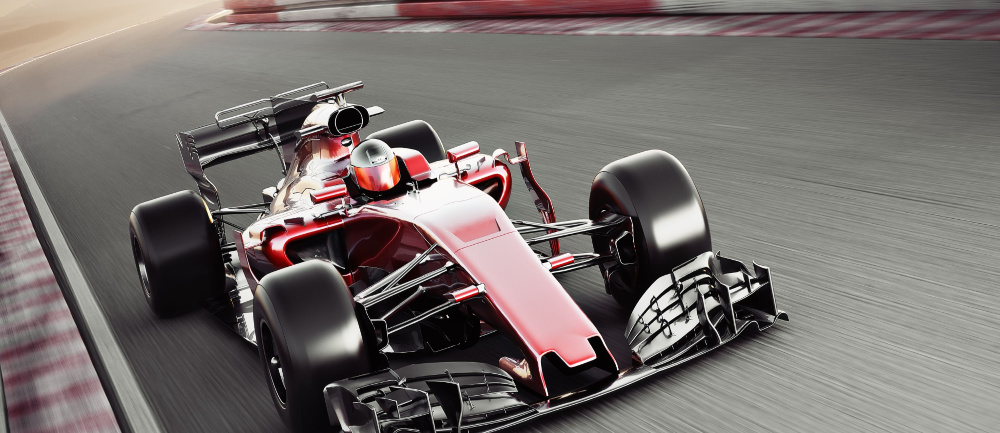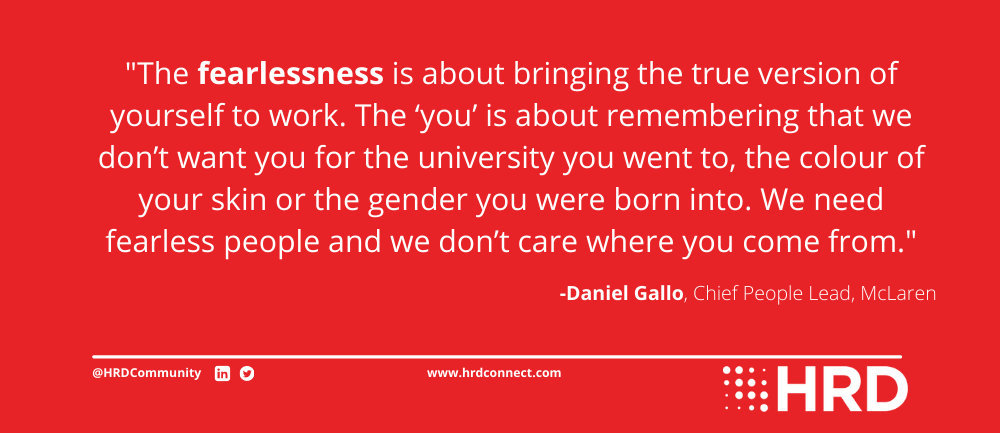-
Provided by

- Date published: Aug 2, 2022
- Categories
McLaren is the most successful team in Formula 1, renowned for its innovative tactics and technology. Now the Woking-headquartered enterprise is applying that same spirit of fearlessness to its DEI drive, as chief people lead Daniel Gallo explains.
Formula 1 oozes wealth and power. Money cascades from the Champagne bottles and plunges from the Monte Carlo yachts. It’s one giant hedonistic playground – as long as you’re white and male.
All but one of F1’s champions has been white. And that sole interloper, Lewis Hamilton, has become a vehement critic of the sport’s diversity deficit, even setting up his own commission to investigate the problem. The commission’s first report, published last summer, revealed that only 1% of all F1 employees are black.
Slowly but surely, however, things are changing.
Although Hamilton has dismissed F1’s ‘We Race As One’ initiative as mere box-ticking, and the sport’s diversity charter remains sadly unsigned, the individual teams are forging their own way forward. And McLaren, Hamilton’s formative team, is determined to be as progressive in its labs and boardrooms as it has always been on the track.
“We are a global brand with a very diverse fanbase,” says Daniel Gallo, McLaren’s chief people officer. “We want to be more representative of the countries we race in, our fans and followers, the partners, and the sponsors that we’re working with.
“We want to be more representative of the communities that we work and race in. That’s our fundamental driver.”

Recruiting for change
Daniel joined McLaren from Liverpool FC, a giant of English soccer’s Premier League and another of Britain’s iconic sporting brands. Now he oversees more than 2,000 employees, with offices in London and New York and a vast caravan of designers, engineers and marketers who follow the drivers around the world.
On his watch, McLaren has committed to recruiting 40% of its staff from diverse, underrepresented, or underprivileged backgrounds. And this DEI campaign is headlined by a glitzy project called McLaren Racing Engage, forged in discussions with a network of DEI torch-bearers.
These stakeholders included Women in Engineering, which aims to improve female representation in the engineering industry; Equal Engineers, which addresses inequality in all its forms, from BAME representation to the provision for disabilities; Creative Access, which provides opportunities for under-represented groups in the marketing and commercial fields; and the Smallpiece Trust, a catalyst for young people to secure careers in science and engineering.
The project has short, medium and long-term horizons. The short-term objectives strive to recruit more established professionals from under-represented groups into the organisation, while the medium-term goals address early-career entry-points for graduates and apprentices. The longest time horizon looks several years ahead and addresses grass-roots talent sources, focusing on issues such as STEM education in schools.
Indeed McLaren has created its own STEM Day, which goes into schools in under-privileged areas, with high diversity demographics, in a bid to encourage science and engineering. It’s also sponsored a group of eighth-grade scholars through the Arkwright programme, providing mentoring, work experience and financial support, and it’s now providing mentors to 25 university students, giving them access to some of the best engineers in the world.
“We’ve taken a multi-dimensional approach in terms of timeframe, target groups and the disciplines that we’re trying to attract from”, Daniel explains. ‘“And we’ve been very clear that we have a duty of responsibility, as a global sports brand, to use that brand for good.
“Whether it results in us recruiting people or not, we need to use [the power of our brand] to shine a light on F1 as an exciting industry to support people from underprivileged backgrounds and under-represented groups.
“But ultimately, even selfishly from a performance point of view, we know that having a more diverse organisation generates better ideation, better decision-making, better creativity. So we want to feed that pipeline in the short, medium and long-term to make sure that we start to develop, deliver a competitive advantage.”
The drive towards a modern, more inclusive McLaren takes a truly holistic sweep of the organisation. Rather than simply focusing on arts-based roles, which traditionally attract a broader pool of candidates than science-based ones, Daniel says the goal is to spread opportunity everywhere.
“Delivering diversity in marketing, HR and finance is easier than delivering diversity into engineering and manufacturing, for sure. But given the way the McLaren staff base is distributed, even if we had all women or all people of colour in those roles, even if we took every diversity model across HR, finance, marketing and commercial, we wouldn’t hit 40%. And the target would be disingenuous.
“We want to diversify across the board and therefore our particular target areas are engineering and production. That’s why, in our alliance [of partners], we’ve got more of a heavy slanting towards these areas. Three of our partners are stem-orientated, one is creative-orientated. And that I think that’s reflective of where we are now, the biggest opportunity.
“But the biggest short-term issue is with supply and demand, and therefore we want to influence that.”

Changing the language
But spreading the gospel of science in schools and universities is not enough on its own; to reach Daniel’s 40% target, McLaren also needs to widen its talent pool in the here and now. And that means changing the language of its recruitment channels to reflect the new, more inclusive organisation McLaren aspires to be.
Daniel doesn’t directly oversee the ads his team puts out, but he’s very much on top of the overall recruitment agenda.
“Your employer brand is ultimately your window out into the world, right, and it’s how people will often perceive and engage with you. It’s not just job adverts, it’s also the tone of voice and language you use in your social posts.
“We focus not just our employer brand, but also our corporate brand. We’ve looked at it holistically: what is our tone of voice? What are the channels we use? How do we present ourselves to the outside world? Then the employer brand is a subset of this.
“With job adverts we work with a tremendous agency who I’ve worked with for many, many years. They’re experts in this space and they’ve really helped us refine our language, to make sure that we are appealing to a broad church of potential candidates. Motor racing has this image of being macho, which it’s not by the way, but it is male-dominated. And that’s obviously one of the things we’re trying to deal with.
“But you have to do that meaningfully, and not through tokenism. It’s not about having a careers website that’s got loads of faces of women, or brown and black faces, when actually our organisation isn’t made up that way, that’s tokenism.
“What it is about is celebrating where we do have diversity, and where we are making progress. It’s about making sure that we’re being open, transparent and inclusive in the language we use, and not coming across as ‘boys’ or ‘racers.’
“Where there are ‘masculinity words’, words associated with aggression or assertiveness, we’ve deliberately softened them or used alternatives. And our strapline for all our ads is ‘Be Fearless: Be You’.
“The fearlessness is about bringing the true version of yourself to work. The ‘you’ is about remembering that we don’t want you for the university you went to, the colour of your skin or the gender you were born into. We need fearless people and we don’t care where you come from.”
McLaren’s approach isn’t driven by targets; rather, it’s a permissive strategy designed to attract the best possible candidates.
“There’s a bit of a misconception out there that in pursuing a diverse workforce, for some reason you have to compromise on the quality of candidates and employees. And I have a strong disdain for that perception. This is about finding the people and giving opportunities to those who are super-talented – just that they may not come from the typical backgrounds of universities.”
‘I haven’t gone to town because I didn’t feel the need’
While the tenor of McLaren’s outward rhetoric has changed considerably, changes to the company’s internal culture have been far more selective.
The people leads have created a training programme in tandem with Equal Engineers, looking at issues like personal preference and bias, and CEO Zak Brown has begun hosting lunches with women from across the organisation, designed to stimulate engagement and conversation. But internal culture has received far less attention than the company’s external face.
The reason, Daniel says, is simple: McLaren’s [internal] culture is already pretty much on-point.
“I haven’t gone to town because I haven’t felt the need to do it. Our values have been around for decades, and I think we’ve already generated an accepting, open organisation.
“We don’t want to patronise diversity and inclusion training. We simply want to make sure that people are aware of their biases – which, you know, often come from our childhoods or where we’re born, the experiences we have – creating a safe environment for people to talk openly about their own viewpoints. And that potential biases they may not have known about.
“If I did have a sense that we were struggling on the inclusion, it was something that I would lean into harder. But for now, what I see is a very welcoming organisation that just requires a further push in terms of creativity as to where we are trying to source our talent from, and that’s where my focus is.”
Overall, the focus appears to be well-positioned. Daniel says he’s had a few minor quibbles – “people have come to me saying ‘if I’m a white guy, does that mean I don’t have a future career here?’, and you’ve got to be sensitive to that as well – the emphasis on recruitment and outreach is already bearing fruit.
In 2021, 43% of all McLaren’s new hires came from under-represented groups. And these hires spanned all job functions, both technical and commercial.

‘A leading light and a beacon of hope’
As F1 faces up to its deeply entrenched associations with wealth and power, Daniel believes McLaren, as the sport’s most successful team, has a key role to play.
“We’re one of nine teams and we can only do what we can do. But I’m damn sure that McLaren is going to be a leading light and a beacon of hope in this.
“It’s certainly early days. Lewis Hamilton has really pushed this hard and credit to him, likewise to Seb Vettel and the other drivers, but this isn’t a topic that gets fixed in a year. It takes 10-15 years. You’ve got to be in it for the long haul.
“But yeah, so far the momentum is positive.”
And as everyone knows, momentum is everything in motorsport.
